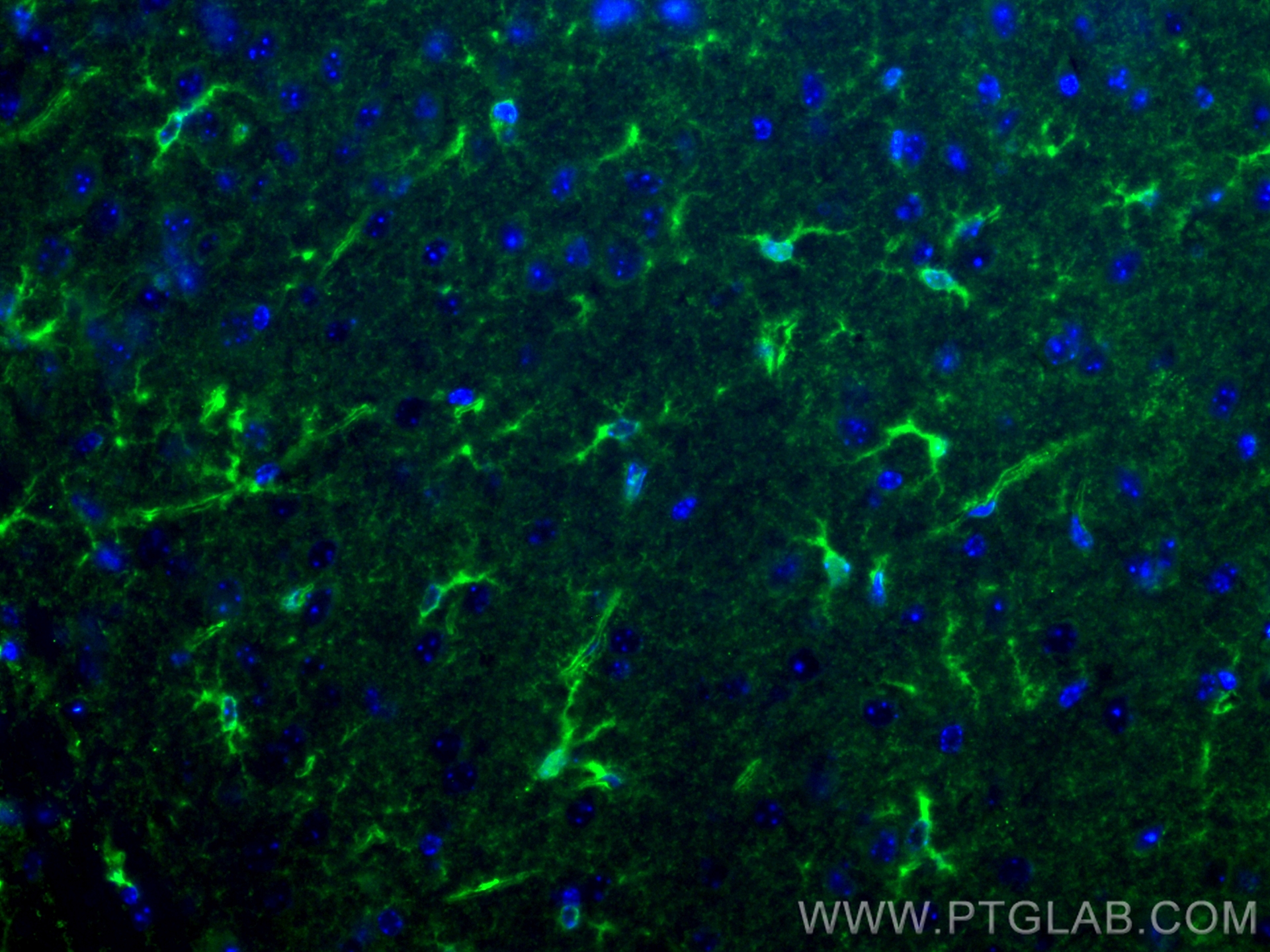验证数据展示
经过测试的应用
| Positive IF-P detected in | mouse brain tissue |
推荐稀释比
| 应用 | 推荐稀释比 |
|---|---|
| Immunofluorescence (IF)-P | IF-P : 1:50-1:500 |
| It is recommended that this reagent should be titrated in each testing system to obtain optimal results. | |
| Sample-dependent, Check data in validation data gallery. | |
产品信息
CL488-17390 targets ALDH1L1 in IF-P applications and shows reactivity with human, mouse, rat samples.
| 经测试应用 | IF-P Application Description |
| 经测试反应性 | human, mouse, rat |
| 免疫原 |
CatNo: Ag11285 Product name: Recombinant human ALDH1L1 protein Source: e coli.-derived, PGEX-4T Tag: GST Domain: 157-505 aa of BC027241 Sequence: DDTVSTLYNRFLFPEGIKGMVQAVRLIAEGKAPRLPQPEEGATYEGIQKKETAKINWDQPAEAIHNWIRGNDKVPGAWTEACEQKLTFFNSTLNTSGLVPEGDALPIPGAHRPGVVTKAGLILFGNDDKMLLVKNIQLEDGKMILASNFFKGAASSVLELTEAELVTAEAVRSVWQRILPKVLEVEDSTDFFKSGAASVDVVRLVEEVKELCDGLELENEDVYMASTFGDFIQLLVRKLRGDDEEGECSIDYVEMAVNKRTVRMPHQLFIGGEFVDAEGAKTSETINPTDGSVICQVSLAQVTDVDKAVAAAKDAFENGRWGKISARDRGRLMYRAPPSPSTRPDPTAT 种属同源性预测 |
| 宿主/亚型 | Rabbit / IgG |
| 抗体类别 | Polyclonal |
| 产品类型 | Antibody |
| 全称 | aldehyde dehydrogenase 1 family, member L1 |
| 别名 | 10 FTHFDH, ALDH1L1, FTHFD |
| 计算分子量 | 99 kDa |
| 观测分子量 | 100 kDa |
| GenBank蛋白编号 | BC027241 |
| 基因名称 | ALDH1L1 |
| Gene ID (NCBI) | 10840 |
| RRID | AB_3672672 |
| 偶联类型 | CoraLite® Plus 488 Fluorescent Dye |
| 最大激发/发射波长 | 493 nm / 522 nm |
| 激发激光 | Blue laser (488 nm) |
| 形式 | Liquid |
| 纯化方式 | Antigen affinity purification |
| UNIPROT ID | O75891 |
| 储存缓冲液 | PBS with 50% glycerol, 0.05% Proclin300, 0.5% BSA, pH 7.3. |
| 储存条件 | Store at -20°C. Avoid exposure to light. Stable for one year after shipment. Aliquoting is unnecessary for -20oC storage. |
背景介绍
Aldehyde dehydrogenase 1 family member L1 (ALDH1L1), belongs to the aldehyde dehydrogenase family of proteins and is responsible for formate oxidation in vivo. Loss of ALDH1L1 is associated with decreased apoptosis, increased cell motility, and cancer progression. ALDH1L1 catalyzes the conversion of 10-formyltetrahydrofolate, nicotinamide adenine dinucleotide phosphate (NADP+), and water to tetrahydrofolate, NADPH, and carbon dioxide. ALDH1L1 has some isoforms with MW of 99, 88 and 55 kDa.
实验方案
| Product Specific Protocols | |
|---|---|
| IF protocol for CL Plus 488 ALDH1L1 antibody CL488-17390 | Download protocol |
| Standard Protocols | |
|---|---|
| Click here to view our Standard Protocols |


